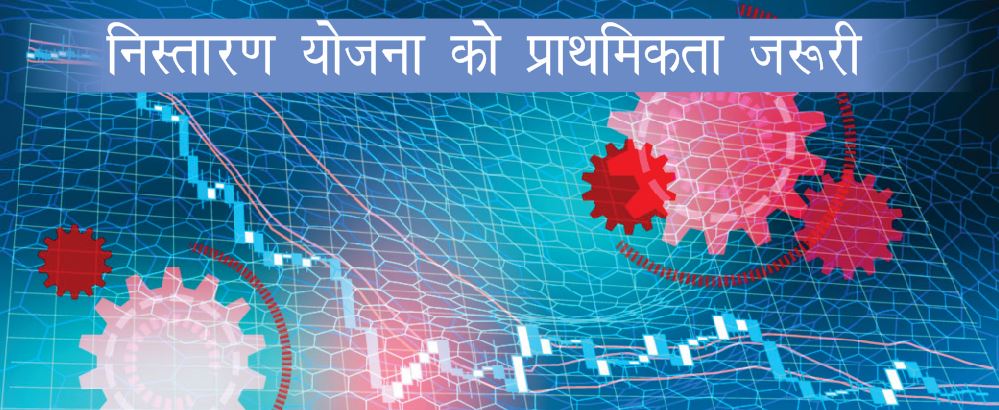
Disposal Plan Needs Priority
- अक्टूबर 4, 2020
- 0
Disposal Plan Needs Priority
Sympathy for companies affected by the shock caused by Covid-19 is an innate human trait. But everything has to be paid. If we are lenient towards the borrowers, then the lenders will have to pay the price. Keep in mind that the lenders in our country are also not in very good condition. An organization should always continue to analyze the world-class and be prepared to react to small and big setbacks. There is considerable flexibility in allocation of resources in a healthy market economy. There firms change their processes and are comfortable with a variety of good bad experiences. Now that the initial shock of the Covid-19 has passed, there is a need for a settlement plan for the companies.
At the concept level, the market economy has to react continuously to changes in consumer behavior and technological prospects. Every institution has to look outside and develop its perspective about the changing world. He has to mould himself according to this new world. A healthy country is one that is ready for constant change and where there is constant reallocation of capital and labor to avoid shocks.
This is the reason why the main principle of Indian economic policy of Pre Covid was that Japaneseization should be avoided so that strong disposal process is developed. Disposal can take place in three ways: existing shareholders bring in new capital with debt restructuring, or sold to the firm or liquidated. With these three methods, the goal of the economic policy makers was to improve the financial condition of the companies. This was the logic of the Lending and Insolvency Code for NBFCs. Similar was the argument of the Settlement Corporation envisaged in the Financial Regulation and Deposit Insurance Bill.
At the end of March there was extreme uncertainty for everyone. For the insolvency process to work properly, we need a relatively stable world where all the private sector people can assess the firm’s prospects and present the estimates to the lender committee. Such expectation from the insolvency process was not true after the intense uncertainty of the last days of March. Therefore it was a fair decision to postpone its functioning.
Now that period of uncertainty has been left behind. Countless small and large organizations have found new ways for themselves. The urban labor participation, which was 40.14 per cent on 22 March, had come down to 31.77 per cent on 26 April and on 30 August it improved again to 38.49 per cent. Looking at this scenario, it is found that some industries like broadband, telecom and e-commerce performed really well. While aviation, retail services and commercial real estate etc. declined. The world has changed.
The job of the market economy is to make better allocation of production factors by tolerating shocks. The time has come to see the Covid-19 as another setback. It is no different from other shakes. For example, e-commerce came and built its place but there was no fault of the traditional retail traders. Whose fault is not important, but it is important to create conditions in which the market economy can function properly. In such a situation, the time has come to prioritize disposal.
There is another aspect where sympathetic stance with borrowers creates difficulty. Healthy financial companies are important for better economic growth. If restraint is introduced and loan adjournment and loan waiver schemes are introduced to help the borrowers, then it will have a bad effect on the lenders. It is not easy to solve the problem of financial companies subject to uncertain tax enforcement. In the case of loan contracts, the agenda of normalizing the situation or disposing of non-financial companies and financial companies is related to each other.
निस्तारण योजना को प्राथमिकता जरूरी
कोविड-19 के कारण लगे झटके से प्रभावित कंपनियों को लेकर सहानुभूति रखना सहज मानवीय गुण है। परंतु हर चीज की कीमत चुकानी पड़ी है। यदि हम कर्जदारों के प्रति नरमी बरतें तो इसकी कीमत कर्ज देने वालों को चुकानी पड़ेगी। ध्यान रहे हमारे देश में कर्ज देने वाले भी बहुत अच्छी स्थिति में नहीं है। एक संगठन को हमेशा विश्वस्तर का विश्लेषण जारी रखना चाहिए और छोटे बड़े झटकों को लेकर प्रतिक्रिया की तैयारी रखनी चाहिए। एक स्वस्थ बाजार अर्थव्यवस्था में संसाधनों के आवंटन में काफी लचीलापन रहता है। वहां फर्म अपनी प्रक्रियाओं में बदलाव करती हैं और विभिन्न प्रकार के अच्छे बुरे अनुभवों को लेकर सहज रहती हैं। अब जबकि कोविड-19 का शुरूआती झटका गुजर चुका है तो कंपनियों के लिए निस्तारण योजना की आवश्यकता है।
अवधारणा के स्तर पर बाजार अर्थव्यवस्था में उपभोक्ताओं के व्यवहार और तकनीकी संभावनाओं में आ रहे बदलाव को लेकर निरंतर प्रतिक्रिया देनी पड़ती है। हर संस्थान को बाहर देखना है और बदलते विश्व के बारे में अपना नजरिया विकसित करना होता है। उसे इस नई दुनिया के हिसाब से खुद को ढालना होता है। एक स्वस्थ देश वही है जो निरंतर बदलाव के लिए तैयार हो और जहां पूंजी और श्रम का निरंतर पुर्नआवंटन होता हो जिससे झटकों से बचा जा सके।
यही कारण है जिसके चलते कोविड पूर्व की भारतीय आर्थिक नीति का प्रमुख सिद्धांत यही था कि जापानीकरण से बचा जाए ताकि मजबूत निस्तारण प्रक्रिया को विकसित किया जाए। निस्तारण तीन तरह से हो सकता है: मौजूदा अंशधारक कर्ज पुनर्गठन के साथ नई पूंजी लाएं, या फर्म का बेच दिया जाए या फिर उसका नकदीकरण किया जाए। इन तरीकों के साथ आर्थिक नीति निर्माताओं का लक्ष्य यह था कि कंपनियों की वित्तीय स्थिति को बेहतर किया जा सके। गैर बैंकिंग वित्तीय कंपनियों के लिए ऋणशोधन और दिवालिया संहिता का यही तर्क था। वित्तीय नियमन एवं जमा बीमा विधेयक में जिस निस्तारण निगम की परिकल्पना की गई थी उसकी दलील भी ऐसी ही थी।
मार्च के अंत में हर किसी के लिए अत्यधिक अनिश्चितता थी। दिवालिया प्रक्रिया के सही ढंग से काम करने के लिए हमें अपेखाकृत स्थिर दुनिया चाहिए जहां निजी क्षेत्र के तमाम लोग फर्म की संभावनाओं का आकलन कर ऋणदाता समिति के सामने आकलन पेश कर सकें। मार्च के अंतिम दिनों की घनी अनिश्चितता के बाद दिवालिया प्रक्रिया से ऐसी अपेक्षा सही नहीं थी। इसलिए इसके कामकाज को स्थगित करना उचित निर्णय था।
अब अनिश्चितत का वह दौर पीछे छूट चुका है। अनगिनत छोटे और बड़े संगठनों ने अपने लिए नए तरीके तलाशे हैं। शहरी श्रम भागीदारी जो 22 मार्च को 40.14 फीसदी थी वह 26 अप्रैल को 31.77 फीसदी रह गई थी और 30 अगस्त को यह सुधरकर पुनः 38.49 फीसदी हुई। इस परिदृश्य पर नजर डालें तो पता चलता है कि ब्राॅडबैंड, दूरसंचार और ई-काॅमर्स जैसे कुछ उद्योगों का प्रदर्शन वाकई बेहतर रहा। जबकि विमानन, खुदरा सेवाओं और वाणिज्यिक अचल संपत्ति आदि में गिरावट आई। दुनिया बदल चुकी है।
बाजार अर्थव्यवस्था का काम है झटकों को सहन कर उत्पानदन कारकों को बेहतर आवंटन करना। अब वक्त आ गया है कि कोविड-19 को एक और झटके के रूप में देखा जाए। यह अन्य झटकों से किसी तरह अलग नहीं है। उदाहरण के लिए ई-काॅमर्स ने आकर अपनी जगह बनाई लेकिन इसमें पारंपरिक खुदरा कारोबारियों की कोई गलती नहीं थी। गलती किसकी है यह महत्वपूर्ण नहीं है बल्कि ऐसे हालात बनाना महत्वपूर्ण जिनमें बाजार अर्थव्यवस्था सही ढंग से काम कर सके। ऐसे में अब वक्त आ गया है कि निस्तारण को प्राथमिकता दी जाए।
एक और पहलू है जहां कर्जदारों के साथ सहानुभूति का रूख कठिनाई पैदा करता है। बेहतर आर्थिक वृद्धि के लिए वित्तीय कंपनियों का स्वस्थ होना महत्वपूर्ण है। यदि संयम का परिचय दिया जाए और कर्जदारों की मदद की ऋण स्थगन तथा कर्ज माफी योजनाएं पेश की जाएं तो इसका कर्जदाताओं पर बुरा असर होगा। अनिश्चित कर प्रवर्तन के अधीन वित्तीय कंपनियों की समस्या का निराकरण करना आसान नहीं है। ऋण अनुबंधों के मामले में हालात सामान्य करने या गैर वित्तीय कंपनियों तथा वित्तीय कंपनियों का निस्तारण करने का एजेंडा आपस में संबंधित है।
































































